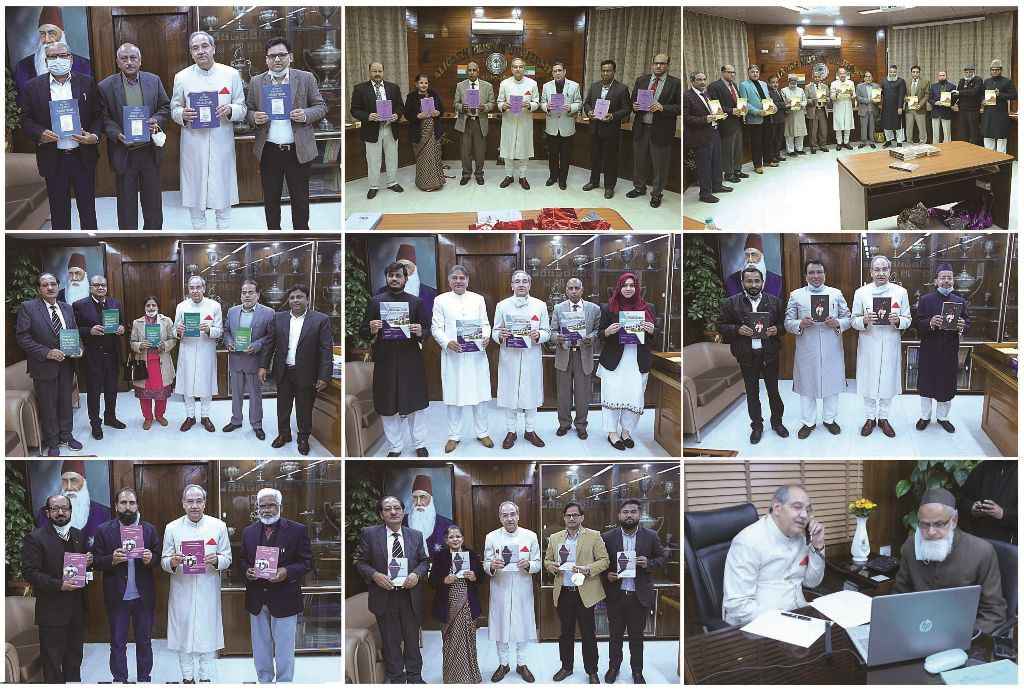Aligarh Muslim University Vice Chancellor released eight scholarly books
Aligarh: The year 2021 promises to be the year of academic publications at the Aligarh Muslim University (AMU). To begin with, the Vice Chancellor, Professor Tariq Mansoor released eight scholarly books, a newsletter and a telephone line. Prof Zaheeruddin (Pro Vice Chancellor) also attended the books releasing ceremony.
They are ‘The Revenue Manual of Rajasthan’ and ‘Jal, Jiwan aur Samaj’ edited by Department of History, faculty member, Dr Jibraeil; ‘Reassessing Gandhian Thought’ edited by Department of Philosophy faculty members, Dr Aamir Riyaz and Shahidul Hoque; ‘Propagation and Genetic Manipulation of Plants’ (Springer Nature, Singapore-2021) edited by Dr Iram Siddique, Department of Botany; ‘Khamoshi Jurm Hai’ by Department of Urdu research scholar, Mohammad Haneef; ‘Triple Talaq in Islam-Judiciary, Politics and Media’, a collection of seminar papers by Department of Islamic Studies faculty members; ‘Centenary Year Publications’, Department of Linguistics; Centenary issue of ‘Tahzeebul Akhlaq’; the Law Society News Letter 2020 and the Telephone Directory of Ajmal Khan Tibbiya College.
Edited by Dr Jibraeil (Department of History), ‘The Revenue Manual of Rajasthan’ narrates the significance of archival source material, ‘Arhsatta’, a distinctive revenue record of Rajasthan covering diverse and vital subjects such as agriculture, environment, banking and accounting systems, forms of peasant protests, crime and punishment, estimation of population, aspects of social history and useful evidence on urban history among other topics.
The book has been published in view of the growing interest of researchers in the archival and literary sources of Rajasthan history. It also gives details of ‘Arhsatta Mujmil Qasba Sanganer’ and highlights the range of information contained on the economic activities, magnitude of taxation in agricultural and non-agricultural products and demography of social groups.
Dr Jibraeil’s another edited work, ‘Jal, Jiwan aur Samaj’ is a collection of essays contributed by a number of academicians and environmentalists. A major highlight of the book is the essay, ‘Paryavaran ke Sahitye Guru the Anupam Mishr’ by water conservationist and environmentalist, Rajendra Singh. Also known as the ‘waterman of India’, Rajendra is a Magsaysay Award and Stockholm Water Prize recipient. Prof Ishrat Alam (Chairman, Department of History) and Prof Yaqub Ali Khan attended the launch of Dr Jibraeil’s books.
‘Reassessing Gandhian Thought’ edited by Department of Philosophy faculty members, Dr Aamir Riyaz and Shahidul Hoque has sixteen splendidly explained chapters, attempting to bring back Gandhian ideas in Indian discourse of thought, language, culture, and community. The book provides fundamental insights on Gandhi’s legacy. Prof Syeda Nuzhat Zeba (Dean Faculty of Arts) and Prof Latif Hussain Shah Kazmi (Chairman, Department of Philosophy) shared views on the relevance of Gandhian thought in the release ceremony.
‘Propagation and Genetic Manipulation of Plants (Springer Nature, Singapore)’ edited by Dr Iram Siddique, Department of Botany gives details of in vitro propagation and genetic manipulation of important aromatic and medicinal plants. The book brings explains latest technologies and innovation in the field of plant biotechnology such as effective protocol of direct and indirect organogenesis, isolation of secondary metabolites, use of somaclonal variation and stress management in plants. Prof Wasim Ahmad (Dean, Faculty of Life Sciences), Prof Nafees A Khan (Chairman, Department of Botany) and Prof Latif Hussain Shah Kazmi (Chairman, Department of Philosophy) attended the release ceremony.
‘Triple Talaq in Islam-Judiciary, Politics and Media’, a collection of seminar papers by Department of Islamic Studies faculty members highlights the popular perception on Triple Talaq issue. Prof Obaidullah Fahad, Dr Aijaz Ahmed and Dr Bilal Ahmad Kutty attended the programme.
The ‘Centenary Year Celebrations’ collection consisting of ‘Aligarh Journal of Linguistics’ and ‘AMU Journal of Language and Media Discourse’ was also released. Edited by Prof M J Warsi (Chairman, Department of Linguistics), the two journals are compilation of all the web talks and other programmes held to mark 100 years of AMU at the Department of Linguistics.
A special centenary issue of Tahzeebul Akhlaq edited by Prof M Saud Alam Qasmi was also released on the occasion. Prof Zaheeruddin (Pro Vice Chancellor), Prof Sufyan Beg (Principal, ZH College of Engineering and Technology), Prof Mujeebur Rahman Khan (Dean, Faculty of Agricultural Sciences), Prof Wasim Ahmad (Dean, Faculty of Life Sciences), Prof Nuzhat Zeba (Dean, Faculty of Arts), Prof M Shakeel Ahmed Samdani (Dean, Faculty of Law), Prof. Ghufran Ahmad (Chairman, Department of Ilmul Advia), Prof M J Warsi (Chairman, Department of Linguistics), Dr Shariq Aqil and Dr Raihan Akhter attended the function.
The release of the Law Society News Letter 2020 was another attraction. The news letter has articles on Prof N R Madhava Menon and Prof Hafizul Rehman (Founder Dean, Faculty of Law) and rare interviews of legal luminaries like the High Court and Supreme Court lawyers and judges. It was released in the presence of Pro Vice Chancellor, Prof Zaheeruddin and Prof M Shakeel Ahmed Samdani (Dean, Faculty of Law), Abdullah Samdani (Former Secretary, Law Society) and Ilsa Israil (Joint Editor, Law Society News Letter).
‘Khamoshi Jurm Hai’ by Department of Urdu research scholar, Mohammad Haneef was released in presence of Prof Badrudduja Khan (Provost) and Prof Prof Mohd Ali Jauhar (Chairman, Department of Urdu). Haneef regularly writes columns for daily newspapers and magazines.
A ‘Media Gate Way’, telephone line connecting the Ajmal Khan Tibbiya College (AKTC) and Hospital with the rest of the University was inaugurated on the occasion. Prof Qazi Mazhar Ali (Member-in Charge, Telephone Department and Dean, Faculty of Science), Prof F S Sherani (Dean, Faculty of Unani Medicine) and Prof Saud Ali Khan (Principal, AKTC) were also present.

